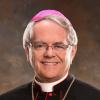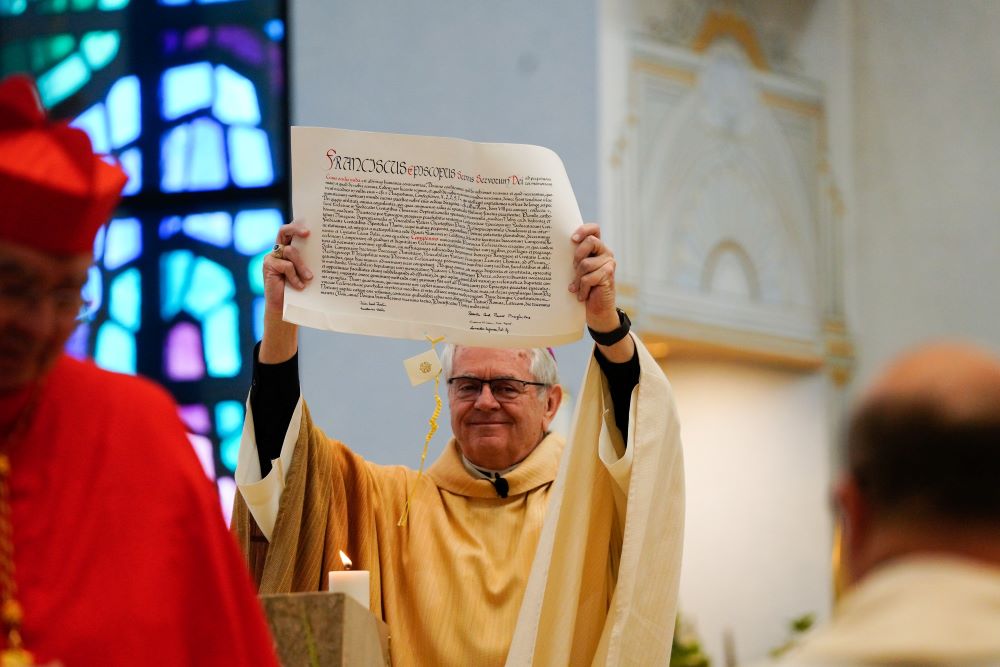
Archbishop George Thomas of Las Vegas processes through the Shrine of the Most Holy Redeemer in Las Vegas with the papal bull from Pope Francis during a Mass for elevating the Diocese of Las Vegas to an archdiocese Oct. 16, 2023. (OSV News/Archdiocese of Las Vegas/Robin Jerstad)
Editor's note: In May, Pope Francis elevated the Diocese of Las Vegas, Nevada, to a metropolitan archdiocese. Archbishop George Thomas celebrated the Mass of Canonical Establishment for the new archdiocese on Oct. 16. He has given NCR permission to publish his post-Communion address for the occasion, which included the participation of Cardinal Christophe Pierre, the Vatican's ambassador to the U.S.
On June 29, the feast of Sts. Peter and Paul, I received the pallium from the hands of our Holy Father, Pope Francis. At today's liturgy, I want to express publicly my solidarity with him, coupled with unyielding support for his Petrine mission and ministry as the successor of St. Peter.
As we consider the past 10 years of Pope Francis' leadership, several important events and leitmotifs come into focus, events and themes that help us to appreciate and value his leadership and legacy both to the church and to the world.
Lampedusa, 'Laudato Si',' caring for others
I will never forget his first pastoral visit outside Rome, when he traveled to Italy's southernmost island — the island of Lampedusa.
He went there with a very particular purpose in mind.
For nearly two decades Lampedusa served as a point of entry for desperate immigrants seeking passage into Western Europe. They came from North Africa and the Middle East, from Egypt and the Sudan, some from as far away as Southeast Asia. They made this perilous maritime journey in order to flee genocide and famine, civil unrest and unspeakable poverty in their respective homelands. The pope was deeply pained by the reality that at Lampedusa, the bodies of immigrants numbering in the hundreds — and mostly women and children — regularly washed up onto the rocky shores like so much driftwood, with others taking little, if any notice.
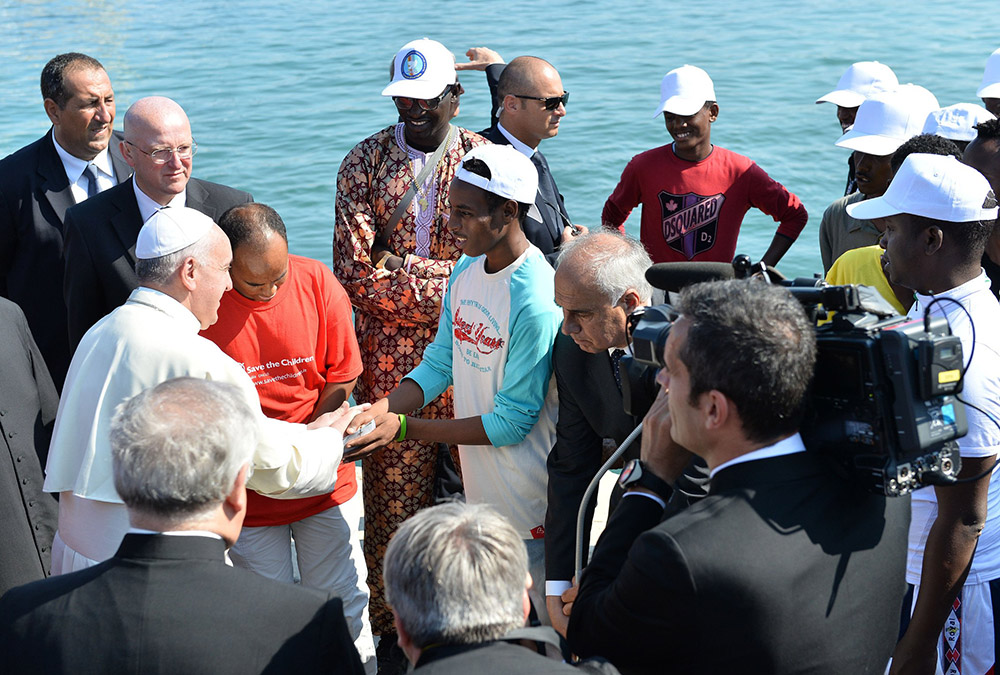
Pope Francis greets immigrants as he arrives at the port in Lampedusa, Italy, July 8, 2013. (CNS/Tullio Puglia, pool)
He went there to awaken the torpid consciences of people everywhere, calling out the "globalization of indifference" toward those beset by this unspeakable suffering and human misery.
His visit was intended as a wake-up call for the whole world and its leaders to hear anew the cry of the poor, and to open channels of hope and new pathways to lawful immigration for desperate immigrants, not only there, but in countries across the globe.
Two years later, in 2015, Pope Francis issued his encyclical entitled Laudato Si' on climate change and the degradation of the environment. This is an encyclical that provides further testimony to the pope's fatherly concern for the poor and hopeless of the world. Yes, Laudato Si' and its newly released coda stand as clarion calls to address vexing and complex problems — pollution, industrial waste, the destruction of the environment, conspicuous consumption and escalating global warming, just to name a few.
Pope Francis poses hard questions to world leaders. How many more families will face premature death or be driven from their native lands as the rainforests are plundered and the oceans are contaminated, all under the banner of profit for the few? The two encyclicals echo the same conviction raised by St. John Paul II in 1991. "God gave the earth to the whole human race for the sustenance of all its members, without excluding or favoring anyone" (Centesimus Annus, 31).
Still other scenes that have touched my heart deeply are the pope's Holy Thursday visits to Casal del Marmo, the youth detention facility in the city of Rome. There he washed and kissed the feet of young inmates, male and female, Christian and Muslim, in profound acts of humility and affection.
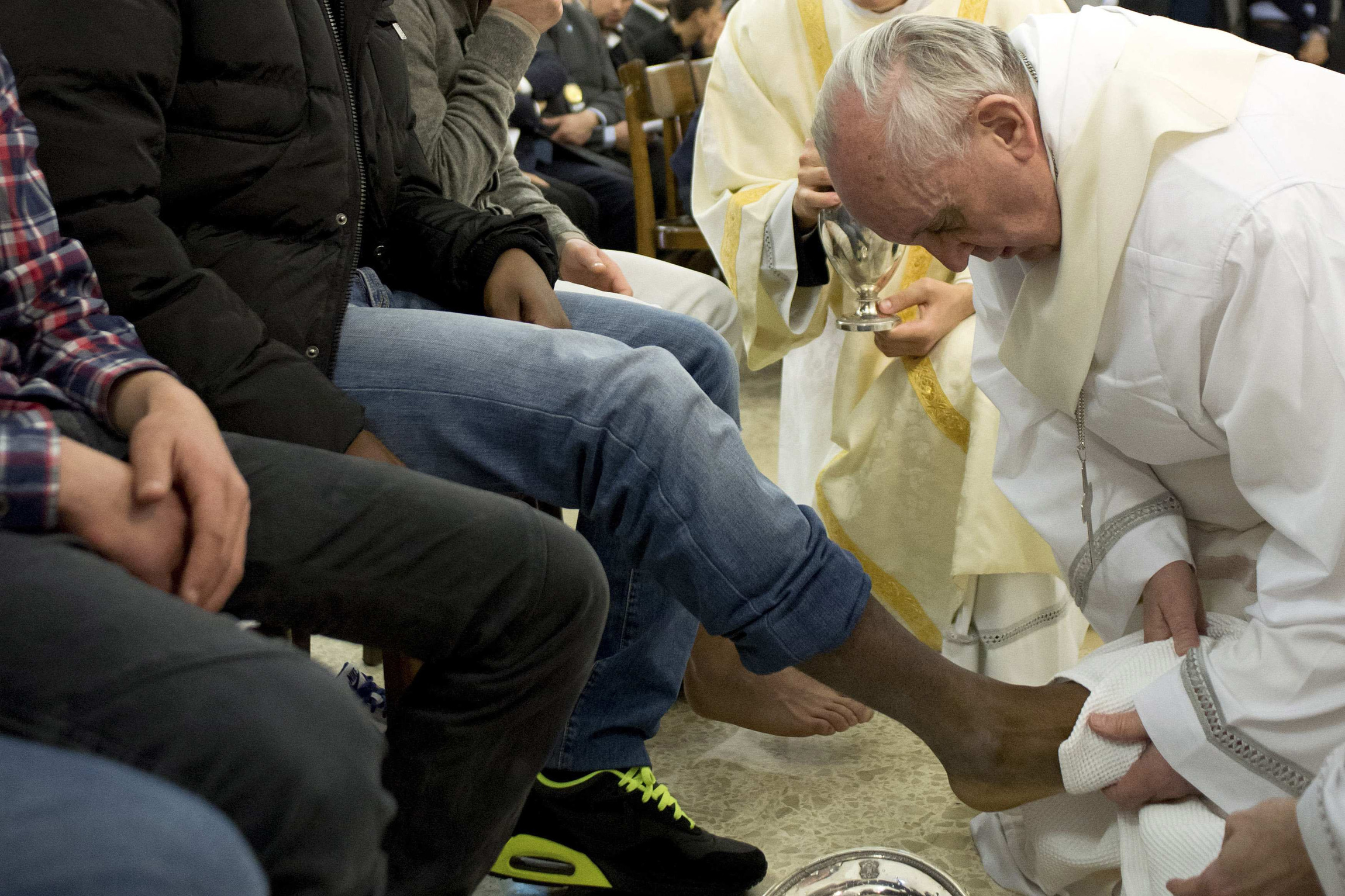
Pope Francis washes the foot of a prison inmate during the Holy Thursday Mass of the Lord's Supper at Rome's Casal del Marmo prison for minors March 28, 2013. Francis washed the feet of 12 young people of different nationalities and faiths, including at least two Muslims and two women, who are housed at the juvenile detention facility. (CNS/Reuters/L'Osservatore Romano)
By word and example, he challenged all of us, but most especially the priests, to bring the Gospel of Jesus to those who live invisibly in our very midst, but too often out of sight and out of mind.
His visits to the youthful offenders stand out as a tutorial on Catholic social teaching, declaring to the world that there are to be no throwaway people, no cast off souls, no discarded lives, no second-class citizens, no "sobrantes" (leftovers) and no exceptions. The Holy Father's example is a living homily on servant leadership, giving flesh and bones to words often attributed to St. Augustine of Hippo: If you look deeply enough into the eyes of any person, there you will see something that is divine.
Reforms in a conciliar key
Since his entrance onto the world stage in 2013, Pope Francis has been resolutely and systematically unleashing the Pentecostal power of the Second Vatican Council. His encyclicals, exhortations, homilies and indeed the example of his daily life, are transmitting and amplifying the council's hallowed teachings.
How often he has echoed the council's deeply held conviction that clergy and laity share common spiritual DNA, the "universal call to holiness," the call that flows from the waters of baptism and leads us into a personal encounter and deep companionship with the Lord Jesus Christ.
Pope Francis has frequently turned his attention to bishops, admonishing us to be not only guardians of unity in our local churches, but also guarantors of lawful diversity, never confusing unity with uniformity.
He has held that "all the Baptized, without exception, are to be agents of evangelization," co-missioned to preach the Gospel of Jesus, first by the example of a holy life and then by inviting others to "taste and see the goodness of the Lord" (Psalm 34:8).
In his audiences and exhortations, he has vehemently proclaimed the church's deeply held conviction that the Eucharist is the "source and summit" of the life of the church, the very flesh and blood of Jesus Christ — our lifeblood, our raison d'etre, the "Bread of Angels" and indeed, the church's "most priceless treasure."
Turning his attention to clergy, he has highlighted the council's emphasis on the primacy of preaching in the ministry of every bishop, priest or deacon, underscoring the potential that good preaching holds in the lives of God's holy people.
In the eyes of Francis, a good homily has the power to form, reform and indeed transform the lives of our people, standing as the "touchstone for judging a pastor's closeness and ability to communicate to his people" (Evangelii Gaudium, 135).
Journeying together
As we speak, the Holy Father is enjoining us to become a more synodal church, a church that listens intently, discerns deeply and plans intentionally, always with an ear that is finely tuned to unpredictable promptings of the Holy Spirit.
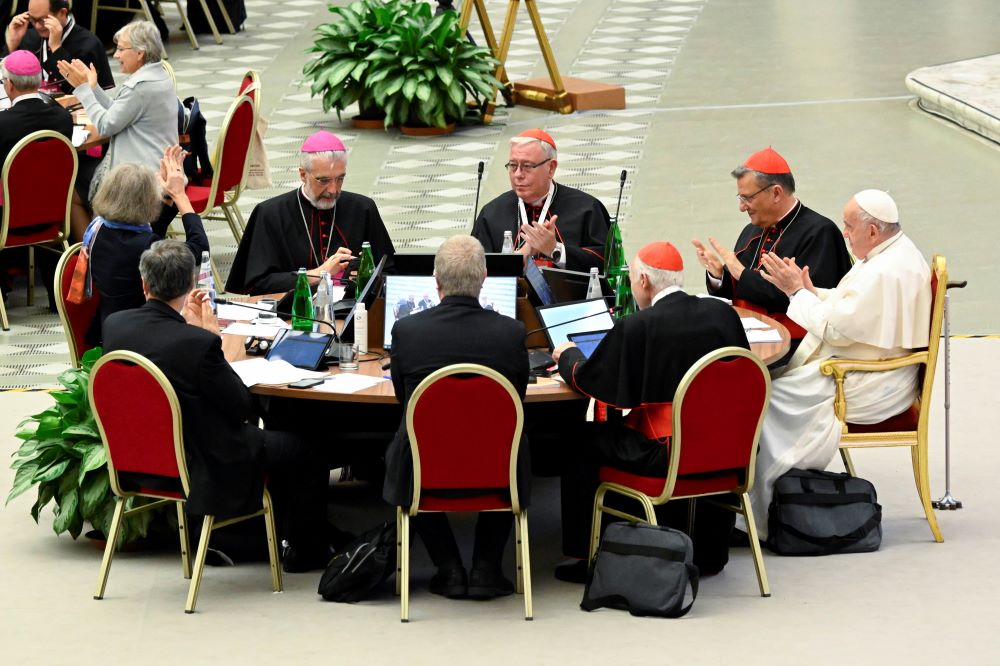
Pope Francis and leaders of the assembly of the Synod of Bishops applaud at the conclusion of the gathering's last working session Oct. 28 in the Paul VI Hall at the Vatican. (CNS/Vatican Media)
Synodality helps the church both to understand and to address, in the words of the Second Vatican Council, "the joys and the hopes, the griefs and the anxieties of the men of this age, especially those who are poor or in any way afflicted …" (Gaudium et Spes, 1).
The themes of accompaniment, discernment and collegiality consistently appear in the writings of Francis, joined by frequent plebeian references like "pueblo fiel" (faithful people), the "sensus fidei" (sense of faith) and the "vox populi" (voice of the people).
In the mind of Francis, a hallowed principle that is rooted in the ancient church and that serves as a vital touchstone for understanding and effecting authentic synodality is: "Quod omnes tangit ab omnibus tractari debet," i.e., "What affects all should be discussed by all."
The Holy Father was raised in the Flores district of Buenos Aires, a culturally diverse neighborhood of working-class immigrants. Young Jorge Bergoglio's friends and neighbors hailed from a panoply of cultures and religions — Armenian, Lebanese, Ukrainian and Eastern European Jews, all bound together by their common will to thrive, and their resolve to face down adversity and misfortune.
The pope's barrio upbringing helps to explain his natural rapport with diverse cultures and peoples everywhere, and his comfort and camaraderie with the leaders of the world's great religions.
¡Viva Jesucristo! ¡Viva Papa Francisco! And ¡Viva Las Vegas!
In that same fraternal spirit, he has enjoined pastors also to build enduring bonds and lasting friendships with our interfaith and ecumenical sisters and brothers in our own communities, many of whom have honored us by their presence at today's liturgy. In the spirit of Vatican II, Pope Francis has frequently turned his attention to bishops, admonishing us to be not only guardians of unity in our local churches, but also guarantors of lawful diversity, never confusing unity with uniformity.
In that same vein, he has asked us to open our hearts and our doors to the diverse cultures that are present within our communities, and to raise up and celebrate our peoples' multifarious customs and ethnic expressions of prayer and praise.
As you observe the leadership style of Pope Francis, you will quickly note his preference for dialogue over diatribe, persuasion over polemic, invitation over invective and accompaniment over alienation, a style of leadership that pays high dividends in our highly polarized and contentious world. This, and so much more, is the Holy Father we know and love.
Advertisement
The pope's living legacy
Taken together, the Gospel of Jesus Christ, the teachings of the Second Vatican Council, and the leadership of Pope Francis serve as our guiding lights in the Archdiocese of Las Vegas. They give us courage in the face of adversity, hope in times of trouble, and vision, direction and inventiveness as we strive to live out our lives as faithful disciples of the Lord Jesus.
Cardinal Pierre, I want to publicly thank you, and through you, express our gratitude to the Holy Father for raising the Diocese of Las Vegas to the rank of an Archdiocese. It is an acknowledgment of the church's expansive growth and a testimony to the dynamism of this local church.
It is also an affirmation of the leadership of our outstanding priests, deacons, religious and lay leaders, gifted women and men laboring together as close collaborators in the fields of the Lord.
You are looking at one of the happiest and most grateful bishops in the United States, and I am thankful for this unmerited privilege of serving as chief shepherd to you, the beloved people of this great Archdiocese.
¡Viva Jesucristo! ¡Viva Papa Francisco! And ¡Viva Las Vegas!
